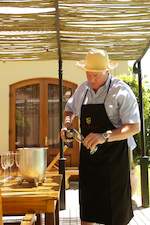In 1986 Neil Ellis went solo, the first independent vintner in the Cape to be a winemaker without vineyards, a French practice then already being adopted in California and Australia. 'I couldn't believe that more people weren't doing it; it made such sense.'

'It' was, of course, seeking out quality grapes in areas most suited to those specific varieties, allowing the grower to tend the vines while he focussed on making the wine, in rented cellar space. 'It' was also based on the realisation that 'no single piece of land can be good for all varieties'.
'It takes 10 years to get to know and understand a vineyard site before you can formulate the appropriate wine policy, then another 10 years to find the ultimate expression of that site in the wine. That's 20 years...which might be half your working life!'
Back then, when the concept of 'estate' was sacrosanct - wines made on-site from grapes grown on a single property were seen as a guarantee of quality - he was considered a bit of a rebel or at least a maverick. Cape winemakers were also hamstrung by the old, entrenched vineyard quota system. It forced them to operate only in previously designated wine-producing areas, 'demarcated by politically-based boundaries', frustrating to those like Neil who saw so much potential in other areas.
The wine industry owes much to the man who went ahead, quietly doing the groundwork for changes in regulations that he and other wine visionaries were agitating for. By the time legislation freed up the opening of new areas from the early 1990s, he was ready with his Neil Ellis Elgin Sauvignon Blanc (then under the Whitehall label) and Neil Ellis Groenekloof Sauvignon Blanc (from Darling).
He admits: 'It's taken me many years to learn that, to achieve anything, to get yourself heard, it's not enough to have the idea or the desire but to be able to enunciate your thoughts and visions in a coherent manner. You need to be able to do that to take people along with you.
‘I used to be like a bull in a china shop when I felt something needed changing, or I wanted to get something done. But I don’t like breaking things down: I believe in working within the system and getting things changed and improved with everyone’s participation and buy-in.'
By the early 1990s, working in the Louisvale cellar in Devon Valley (at the same time vinifying their chardonnay for them), he was receiving grapes from growers all over Stellenbosch, as well as from Elgin and Darling.
He had also been among the first (in the mid-1980s) to link up with leading local supermarket chain Woolworths, whose wine department was later taken to great heights by wine buyer Allan Mullins. Both were committed to achieving the perfect balance in wine between quality, drinkability and price. His brand had already become bywords for elegance, finesse and consistency.
Neither Neil nor his wines have ever been about showmanship. His so-called non-conformity has invariably been based on creating an environment in which he and others could produce the quality they knew they and the terroir were capable of.
By this time he had gone into partnership with Hans-Peter Schröder on Oude Nektar farm in the Jonkershoek Valley, building a state-of-the-art winery and working with vineyards in a wine ward renowned for its reds, particularly cabernet sauvignon. Refinement continued, including a slight change in modus operandi.
Persuaded by increasing competition from big, corporate approaching the same growers that he had been sourcing his grapes from, Neil took a shareholding in vineyards in Darling and started negotiating long-term contracts with all his growers. These were subsequently extended in some cases to outright ownership of the vineyard.
 Grilled fresh snoek with apricot and lemon basting sauce served with sweet potato au gratin by Neil Elis paired with Neil Ellis Stellenbosch...
Grilled fresh snoek with apricot and lemon basting sauce served with sweet potato au gratin by Neil Elis paired with Neil Ellis Stellenbosch... Neil Ellis’s marinated barbecued springbok fillet recipe paired with Neil Ellis Vineyard Selection Cabernet Sauvignon....
Neil Ellis’s marinated barbecued springbok fillet recipe paired with Neil Ellis Vineyard Selection Cabernet Sauvignon....